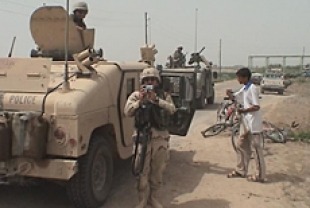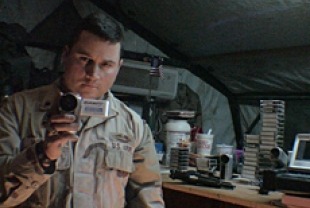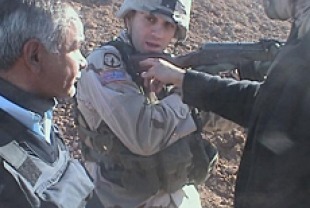Given a chance to embed herself in the New Hampshire National Guard, journalist and documentarian Deborah Scranton decided instead to give cameras to three men who had signed up to serve in Operation Iraqi Freedom. With mini-cams perched on the dashboards of vehicles and on guns or helmets, they tried to capture and convey the ambushes, explosions, and violence they encountered. It is not a pretty picture. Scranton kept in touch with these soldiers and their war tapes along with producer Robert May (The Fog of War) and producer-editor Steve James (Hoop Dreams).
Sgt. Steve Pink, a carpenter and writer, joined the National Guard to help pay for college. His footage includes some gory shots of bodies of enemy combatants. In his journal, he observes: "Every once in awhile as we're driving down the road or creeping along a patrol, I have a reoccurring epiphany — this is happening and will have a lasting impact on me for the rest of my life. A debate we had earlier in the day over the consistency and texture of a severed limb was not some far off grotesque assumption. It was a genuine argument between the guy who swears it resembles hamburger, ground up but uncooked and the guy who believes it looks more like a raw pot roast."
Spc. Mike Moriarty, a 35-year-old mechanic with a wife and two kids, comes across as a very patriotic and angry man. He carries both of these emotions home and finds that there is very little interest in the war or what he did over there. His wife sees a dark cloud hanging over her husband.
Sgt. Zack Bazzi, a Lebanese-American, stuns his mother by going to Iraq after she spent most of her time and energy bringing him to a place that was not a war zone. He is a smart and confident young man who is critical of the ignorance of American soldiers about Iraqis. But there is something inside him that is addicted to war and the thrill of danger. And although this breaks his mother's heart, he doesn't care.
Although supportive of these men as warriors, this documentary reveals how war embraces many follies and hardens the heart. Think about the plight of soldiers dying so that the KBR division of Halliburton can deliver supplies. Then think about the little Iraqi girl who is hit by a Hummer and then run over by several other vehicles in a convoy — another civilian considered as collateral damage. But the most telling criticism of Operation Iraqi Freedom is the lack of moral and financial support given Pink and Moriarty once they return home displaying symptoms of post-traumatic stress disorder.
It's an old, old story in America: plenty of money for bombs, plenty of money for war profiteers like Halliburton, plenty of money for big businneses, but little support for the men and women whose bodies, minds, and hearts are damaged in wars.


